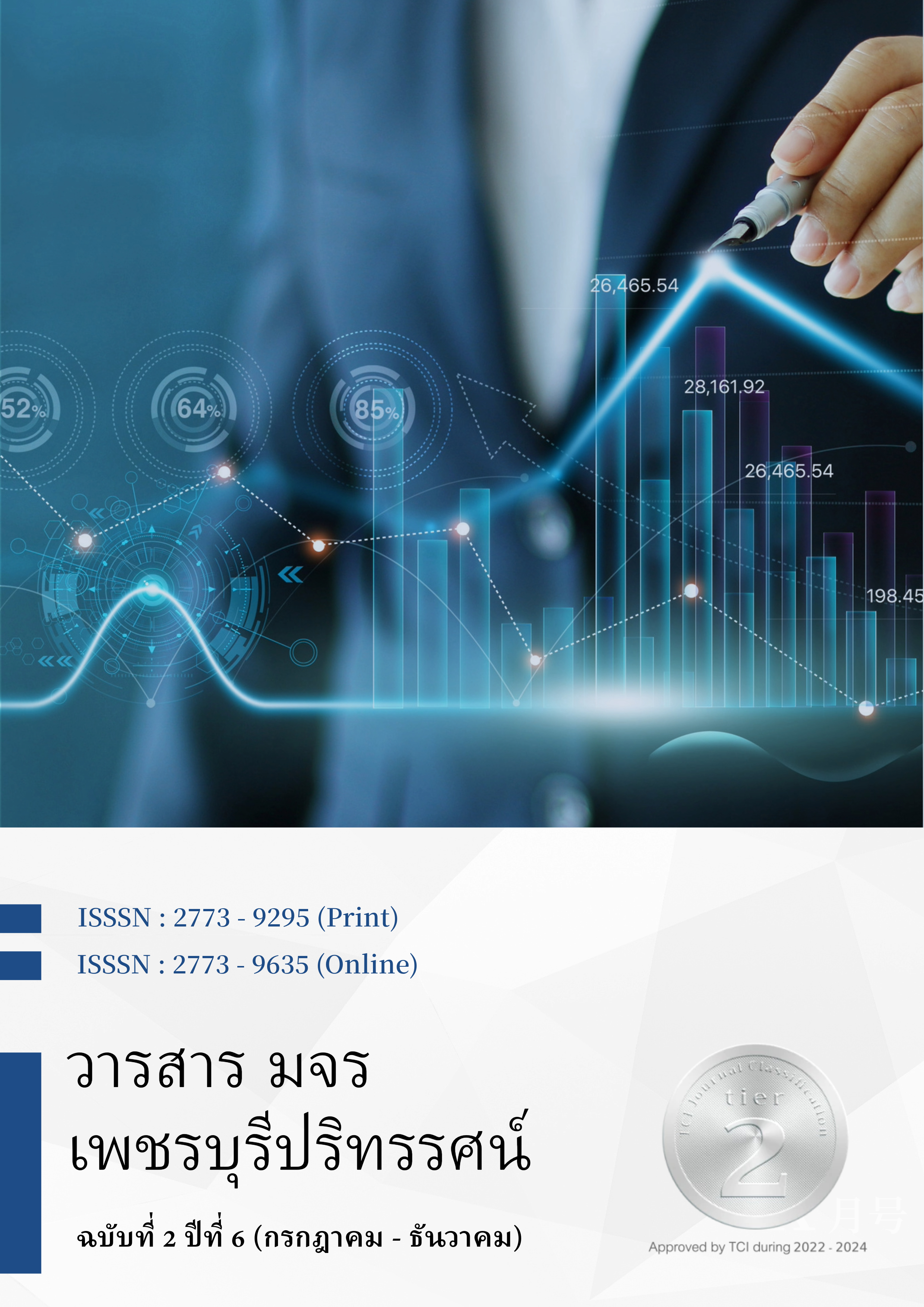Authentic assessment in the digital age.
Main Article Content
Abstract
This article aims to disseminate the principles of actual learning measurement and evaluation in the digital age by realistic assessment and teaching and learning methods in the digital age. It is a form of assessment for students to know and understand changes in the digital age. through knowing and understanding digital skills Currently, there is a form of teaching and learning that facilitates and supports students. and enables teachers to manage learning activities and deliver subject matter. through information technology and multimedia systems Although there are popular methods that can increase learning efficiency such as E-Mail, Chat, Social Network, evaluating teaching and learning in the digital age according to real conditions. There is also a need for proper management according to the principles of academic evaluation. to enhance the ability of the learners Therefore, learning assessment should use a variety of assessment methods and gather a variety of data to reflect expected behavior in learners. Authentic assessment tools, such as Google Classroom, Plickers, Socrative etc., are tools to help measure and evaluate learning in a realistic way in the digital age. that can be assessed and provide guidelines for learners to develop themselves Assessments help learners understand their learning objectives. and learning outcome criteria that leads to the achievement of the students themselves.
Article Details

This work is licensed under a Creative Commons Attribution-NonCommercial-NoDerivatives 4.0 International License.
References
จตุภูมิ เขตจัตุรัส. (2560). วิธีการและเครื่องมือประเมินการเรียนรู้ของผู้เรียน. ขอนแก่น : โรงพิมพ์มหาวิทยาลัยขอนแก่น.
ชาตรี เกิดธรรม. (2560). การประเมินตามสภาพจริง (Authentic Assessment). ปทุมธานี : โรงพิมพ์มหาวิทยาลัยราชภัฏวไลยอลงกรณ์ในพระบรมราชูปถัมภ์.
ชูศักดิ์ ยืนนาน, กนกวรรณ เอี่ยมชัย และพิมลพรรณ เนียมหอม. (2563). การประเมินผลตามสภาพจริงในการเรียนรู้ออนไลน์ : ก้าวสู่การประเมินผลการเรียนหลายรูปแบบสู่ความสำเร็จของผู้เรียน. วารสารการพยาบาล การสาธารณสุขและการศึกษา, 21(3).
ดิเรก วรรณเศียร. (2564). MACRO model: รูปแบบการจัดการเรียนรู้สำหรับศตวรรษที่ 21 สืบค้นเมื่อ 11 มีนาคม 2566. จาก https://regis.dusit.ac.th/images/news/1421308421_MACRO%20รูปแบบการสอนในศตวรรษที่%2021.pdf.
นิภา กิมสูงเนิน และสุวรีย์ เพชรแต่ง. (2559). ผลการใช้สื่อการสอนอิเล็กทรอนิกส์ต่อผลสัมฤทธิ์ทางการเรียน ของนักศึกษาพยาบาลมหาวิทยาลัยรังสิต. วารสารพยาบาลกาชาดไทย. 9(1).
วรพจน์ วงศ์กิจรุ่งเรือง และอธิป จิตต์ฤกษ์. (2554). ทักษะแห่งอนาคตใหม่: การศึกษาเพื่อศตวรรษที่ 21. กรุงเทพฯ: openworlds.
วิจารณ์ พานิช. (2560). “เส้นทางสู่คุณภาพการศึกษายุคประเทศไทย ๔.๐”. การประชุมเชิงวิชาการทางการศึกษาระดับชาติ ครั้งที่ 4 มหาวิทยาลัยวงษ์เชาวลิตกุลศูนย์ประชุมสตาร์เวลล์ จังหวัดนครราชสีมา. นครราชสีมา : มหาวิทยาลัยวงษ์ชวลิตกุล.
ศศิธร บัวทอง. (2560). การวัดและประเมินทักษะการเรียนรู้ในศตวรรษที่ 21. วารสารอิเล็กทรอนิกส์ Veridian มหาวิทยาลัยศิลปากร, 10(2).
สำนักงานบริหารงานการมัธยมศึกษาตอนปลาย. (2558). แนวทางการจัดทักษะการเรียนรู้ในศตวรรษที่ 21 ที่เน้นสมรรถนะทางสาขาวิชาชีพ. สานักงานคณะกรรมการการศึกษาขั้นพื้นฐาน. สืบค้นเมื่อ 11 มีนาคม 2566. จาก http://106.0.176.61/useb/Century21.pdf.
สำราญ กําจัดภัย (2559). การประเมินตามสภาพจริงในชั้นเรียน. วารสารวิชาการหลักสูตรและการสอน มหาวิทยาลัยราชภัฏสกลนคร. 23(8).
อติพร เกิดเรือง. (2560). การส่งเสริมการเรียนรู้ในศตวรรษที่ 21 เพื่อรองรับสังคมไทยในยุคดิจิทัล. วารสารวิชาการ มหาวิทยาลัยราชภัฏลำปาง 6(1).
National Research Council of America. (2011). Assessing 21st century skills - Summary of a workshop. Washington, DC: National Academies Press.
Skolverket. (2020). English for Upper Secondary School. Available on 12 March 2023. https://www.skolverket.se/download/18.4fc05a3f164131a74181056/1535372297288/English-swedish-school.pdf.
Thuong Thi Kim Nguyen & Huyen Minh Phan. (2020). AUTHENTIC ASSESSMENT: A REAL LIFE APPROACH TO WRITING SKILL DEVELOPMENT. International Journal of Applied Research in Social Sciences, 2, 20-30.


